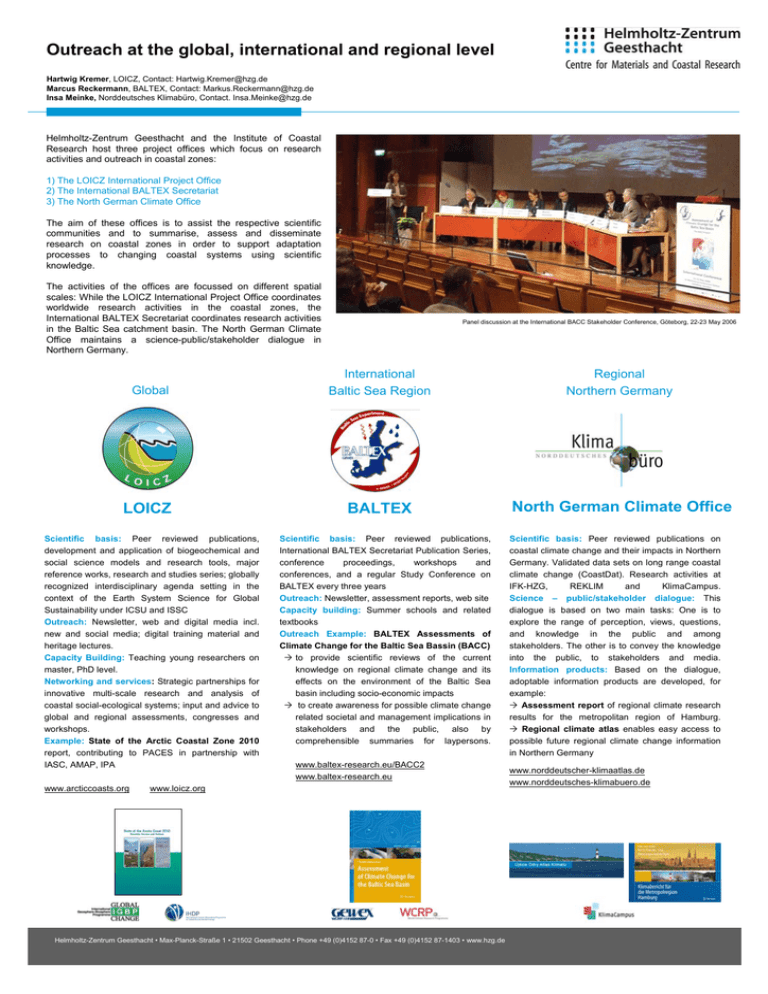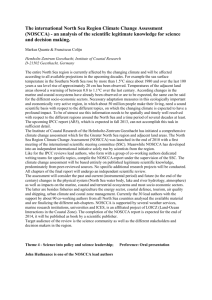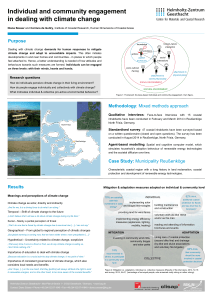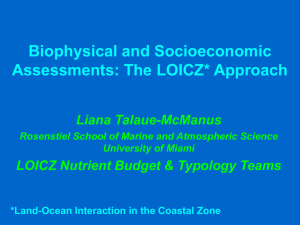Outreach at the global, international and regional level
advertisement

Outreach at the global, international and regional level Hartwig Kremer, LOICZ, Contact: Hartwig.Kremer@hzg.de Marcus Reckermann, BALTEX, Contact: Markus.Reckermann@hzg.de Insa Meinke, Norddeutsches Klimabüro, Contact. Insa.Meinke@hzg.de Helmholtz-Zentrum Geesthacht and the Institute of Coastal Research host three project offices which focus on research activities and outreach in coastal zones: 1) The LOICZ International Project Office 2) The International BALTEX Secretariat 3) The North German Climate Office The aim of these offices is to assist the respective scientific communities and to summarise, assess and disseminate research on coastal zones in order to support adaptation processes to changing coastal systems using scientific knowledge. The activities of the offices are focussed on different spatial scales: While the LOICZ International Project Office coordinates worldwide research activities in the coastal zones, the International BALTEX Secretariat coordinates research activities in the Baltic Sea catchment basin. The North German Climate Office maintains a science-public/stakeholder dialogue in Northern Germany. Panel discussion at the International BACC Stakeholder Conference, Göteborg, 22-23 May 2006 Global International Baltic Sea Region Regional Northern Germany LOICZ BALTEX North German Climate Office Scientific basis: Peer reviewed publications, development and application of biogeochemical and social science models and research tools, major reference works, research and studies series; globally recognized interdisciplinary agenda setting in the context of the Earth System Science for Global Sustainability under ICSU and ISSC Outreach: Newsletter, web and digital media incl. new and social media; digital training material and heritage lectures. Capacity Building: Teaching young researchers on master, PhD level. Networking and services: Strategic partnerships for innovative multi-scale research and analysis of coastal social-ecological systems; input and advice to global and regional assessments, congresses and workshops. Example: State of the Arctic Coastal Zone 2010 report, contributing to PACES in partnership with IASC, AMAP, IPA www.arcticcoasts.org Scientific basis: Peer reviewed publications, International BALTEX Secretariat Publication Series, conference proceedings, workshops and conferences, and a regular Study Conference on BALTEX every three years Outreach: Newsletter, assessment reports, web site Capacity building: Summer schools and related textbooks Outreach Example: BALTEX Assessments of Climate Change for the Baltic Sea Bassin (BACC) to provide scientific reviews of the current knowledge on regional climate change and its effects on the environment of the Baltic Sea basin including socio-economic impacts to create awareness for possible climate change related societal and management implications in stakeholders and the public, also by comprehensible summaries for laypersons. www.baltex-research.eu/BACC2 www.baltex-research.eu www.loicz.org Helmholtz-Zentrum Geesthacht • Max-Planck-Straße 1 • 21502 Geesthacht • Phone +49 (0)4152 87-0 • Fax +49 (0)4152 87-1403 • www.hzg.de Scientific basis: Peer reviewed publications on coastal climate change and their impacts in Northern Germany. Validated data sets on long range coastal climate change (CoastDat). Research activities at IFK-HZG, REKLIM and KlimaCampus. Science – public/stakeholder dialogue: This dialogue is based on two main tasks: One is to explore the range of perception, views, questions, and knowledge in the public and among stakeholders. The other is to convey the knowledge into the public, to stakeholders and media. Information products: Based on the dialogue, adoptable information products are developed, for example: Assessment report of regional climate research results for the metropolitan region of Hamburg. Regional climate atlas enables easy access to possible future regional climate change information in Northern Germany www.norddeutscher-klimaatlas.de www.norddeutsches-klimabuero.de







